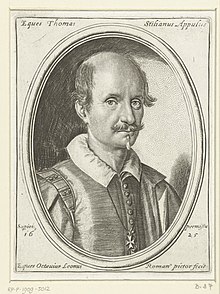Tommaso Stigliani
Tommaso Stigliani | |
|---|---|
 Tommaso Stigliani | |
| Born | 28 June 1573 |
| Died | 27 January 1651 (aged 77) |
| Alma mater | University of Naples Federico II |
| Occupations |
|
| Parent(s) | Giovan Domenico Stigliani and Geronima Stigliani (née d’Adamo) |
| Writing career | |
| Language | Italian |
| Literary movement |
|
| Notable works | Il mondo nuovo Dello occhiale |
Tommaso Stigliani (Italian: [tomˈmaːzo stiʎˈʎani]; 28 June 1573 – 27 January 1651) was an Italian poet, literary critic, and writer, best known for his enmity with Giambattista Marino.[1]
Biography
He was born in Matera, and educated in Naples where he met with the poets Torquato Tasso and Giambattista Marino. With the latter, Stigliani started a lifelong polemic and argument. Especially in Dello occhiale (Venice: Carempello, Sandro Bazacchi, 1627), Stigliani laments Marino's many “failures” in the poem Adone. Marino refused, Stigliani indignantly points out, to follow Aristotle's unities, ignoring the need for a proper beginning, middle, and an end. The poem is overwhelmed by superfluities, enthusiasms, and disproportion. In chapter 6, Stigliani regrets the way Marino “stumbles” through the episodes of Adonis and Venus. And so on, for more than 500 pages (there are tables at the end that list all of Marino's “errors”).[2]
Stigliani's contentious personality led him initially to seek employment in various courts of Northern Italy, including
Thanks to his friendship with Galileo supporter Virginio Cesarini, Stigliani was given the task of editing Galileo's Saggiatore (The Assayer) (1623).[3] Stigliani died in Rome on 27 January 1651. His letters were published posthumously in 1661.[4]
Works
- Stigliani, Tommaso (1600). Il Polifemo. Milano.
{{cite book}}: Unknown parameter|agency=ignored (help) - ————— (1617). Il mondo nuovo (1 ed.). Piacenza.
{{cite book}}: Unknown parameter|agency=ignored (help) - ————— (1628). Il mondo nuovo (2 ed.). Roma.
{{cite book}}: Unknown parameter|agency=ignored (help) - ————— (1623). Il canzoniero del signor caualier fra' Tomaso Stigliani. Roma: per l'erede di Bartolomeo Zannetti.
- ————— (1627). Dello occhiale opera difensiua del caualier fr. Tomaso Stigliani. Scritta in risposta al caualier Gio. Battista Marini. Dedicato all'eccellentiss. sig. conte D'Oliuares. Venezia.
{{cite book}}: Unknown parameter|agency=ignored (help) - ————— (1651). Lettere del caualiere fra Tomaso Stigliani dedicate al sig. prencipe di Gallicano. Roma.
{{cite book}}: Unknown parameter|agency=ignored (help)
References
- ^ Slawinski 2002.
- ISBN 9780521843416.
- ^ Hester 2012, p. 208.
- ^ Scifoni, Felice (1849). Dizionario biografico universale [Universal Biographical Dictionary] (in Italian). Vol. 5. Florence: Davide Passagli. p. 171.
Sources
- Hester, Nathalie (2012). "Failed New World Epics in Baroque Italy". Poesis and Modernity in the Old and New Worlds. ISBN 9780826518347.
- Slawinski, M. (2002). Stigliani, Tommaso. )
Further reading
- Lazzarini, Andrea (2019). "STIGLIANI, Tommaso (Tomaso)". ISBN 978-8-81200032-6.
- Menghini, Mario (1892). Tommaso Stigliani: contributo alla storia letteraria del secolo XVII. Genoa.
{{cite book}}: CS1 maint: location missing publisher (link) - Maragoni, Gian Piero (1989). "Stigliani «ne varietur». Appunti sulla riscrittura del «Polifemo»". Lettere Italiane. 41 (1): 90–98. JSTOR 26264542.
- Pieri, Marzio (1992). "«Les Indes Farnesiennes». Sul poema colombiano di Tommaso Stigliani". Annali d'Italianistica. 10: 180–189. JSTOR 24004484.
- Watt, Mary A. (2011). "Cosmopoiesis: Dante, Columbus and Spiritual Imperialism in Stigliani's "Mondo nuovo"". S2CID 161219982.
- Valencia, María Dolores (2022). "Cultura y polemica literaria en el epistolario de Tommaso Stigliani". Encrucijadas en la Cultura Italiana. Dykinson, S.L.: 253–260. ISBN 9788411224048.
External links
- Tommaso Stigliani entry (in Italian) by Luigi Fassò in the Enciclopedia italiana, 1936
